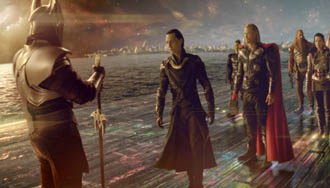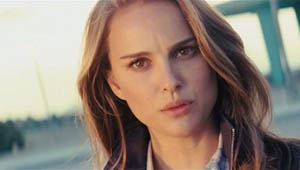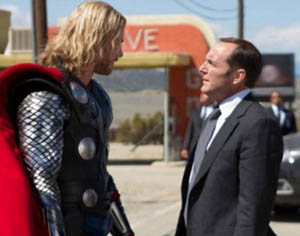|
I must confess some trepidation going into this one, particularly with regards to the much-ballyhooed Avengers team-up movie in the works. At least Iron Man and The Incredible Hulk claim, with variable believability, a scientific basis for their respective heroes. Thor, on the other hand, is a god. Plain and simple. Accepting such a thing as existing in the same world as Tony Stark and his battles against a corrupt military-industrial complex and global terrorists seemed incongruous, but here it works better than I expected. How well it works when they're sharing the screen remains to be seen. 
Thor in many ways is like Marvel Comics' answer to DC's Superman. Both are super-strong, and can fly. Both are essentially aliens, sent by their fathers to Earth, tasked with doing good. It's the differences that are important. Superman is essentially invulnerable to anything but Kryptonite, whereas Thor has no single, conveniently defined weakness and depends upon a weapon for much of his derring-do. Superman/Clark Kent is pure and wholesome, apparently from birth; Thor is bombastic and arrogant (and has no secret identity, as if he would ever hide his awesomeness from the world). And where Superman was sent to Earth for his own salvation, Thor's arrival on our plane of existence constitutes penance. His militant mindset and braggadocio have threatened to plunge his homeland of Asgard into war with their old enemies, the Frost Giants of Jotunheim. Born with all of the abilities of a hero, he must also learn the temperment of one. 
Thor's arrival on Earth does not pass unnoticed. A young physicist believes his remarkable materialization may provide her the evidence she needs to prove the existence of wormholes, while a shadowy government agency sets up shop in the desert following the appearance of a strange artifact. Meanwhile, in Asgard, Thor's younger brother Loki is tormented by the implications of secrets exposed during his and Thor's ill-advised exploits in Jotunheim. While no one with even a cursory familiarity with Norse mythology will be surprised to find Loki the villain of the piece, his reasons and motives lift him above the level of the average comic-book baddy. A quiet, retiring sibling lacking the charisma of his brother, one sees a thwarted ambition, desiring to be the Godfather but apparently doomed to be Fredo. While he schemes to usurp the throne of Asgard, his objectives remain just out of sight, his insecurities and need to prove himself driving him in ways not unknown in the pantheon of real-world victimizers. 
One walks a thin line with a character like Thor-he must be pompous and violent without veering into the territory of the brainless oaf, or worse, the realm of deliberate camp. Fortunately, Chris Hemsworth and director Kenneth Branagh (no stranger to pomposity himself) find the right tone; there may be just a few too many fish-out-of-water jokes at our hero's expense, but our Viking god is always sincere, prideful but honest at heart. The weak link here is Natalie Portman's Jane Foster; not only does she overact in an underwritten role, but her interactions with Thor feel more like those of a cheerleader desperate to land the hot new quarterback, and frankly she feels less like a scientist than any character should in a film not featuring creationists. Kat Dennings as intern Darcy manages to create a more entertaining and believeable persona with a fraction of the screen time. However, the real problem with Jane-and by extension, the Earth-based conflict-is that she doesn't motivate anything that happens in the story, and is relegated to the role of observer until the final act, when even observation is denied her. One could easily imagine the story without her, but for the fact that she enables the presence of scenes involving the understated yet enigmatic Agent Coulson, who is far more entertaining. Ultimately, Thor works. It shouldn't, given the lack of serious threat leveled against the world with which we're theoretically supposed to be invested, but the lack of overall cohesion is made up for by the presence of an antagonist who's pleasantly well-performed and who thankfully fails to play a by-the-numbers role. And I'll give the production design props for managing to create something called a "rainbow bridge" without it feeling too...too...well, you know what I mean, right? -review by Matt Murray
|
|
||||||||